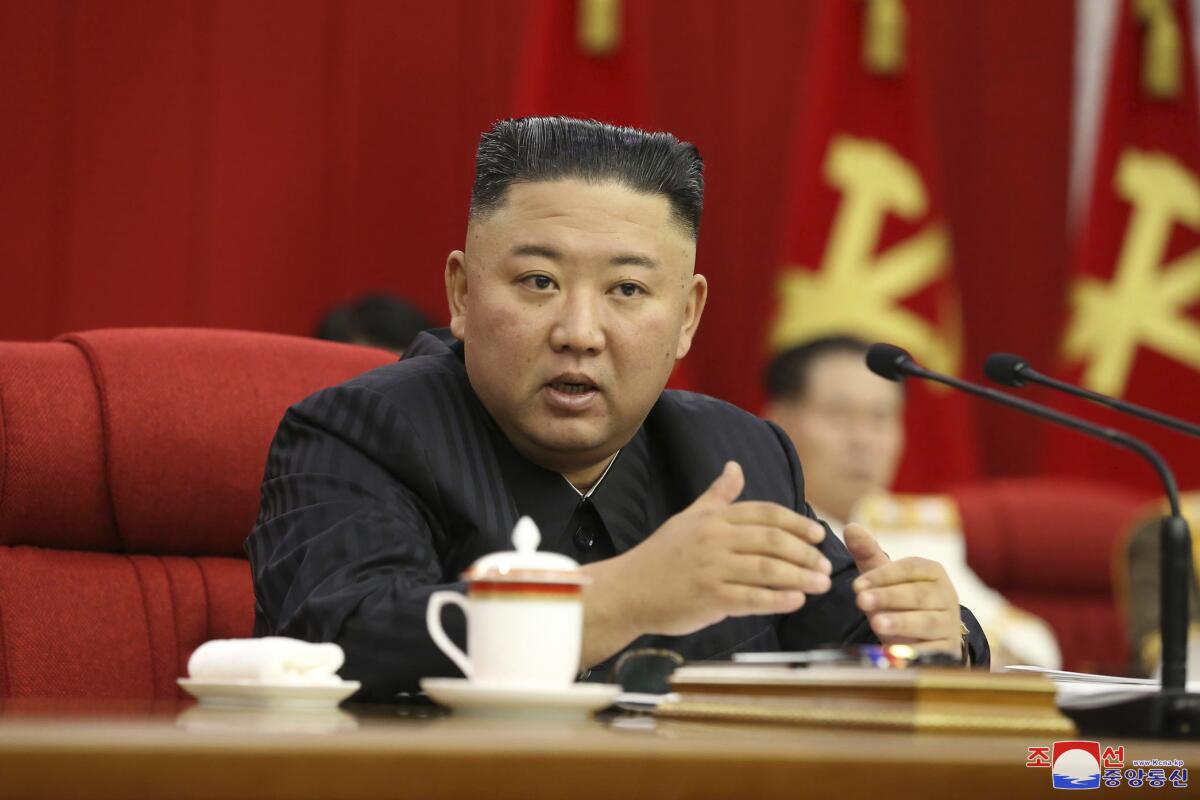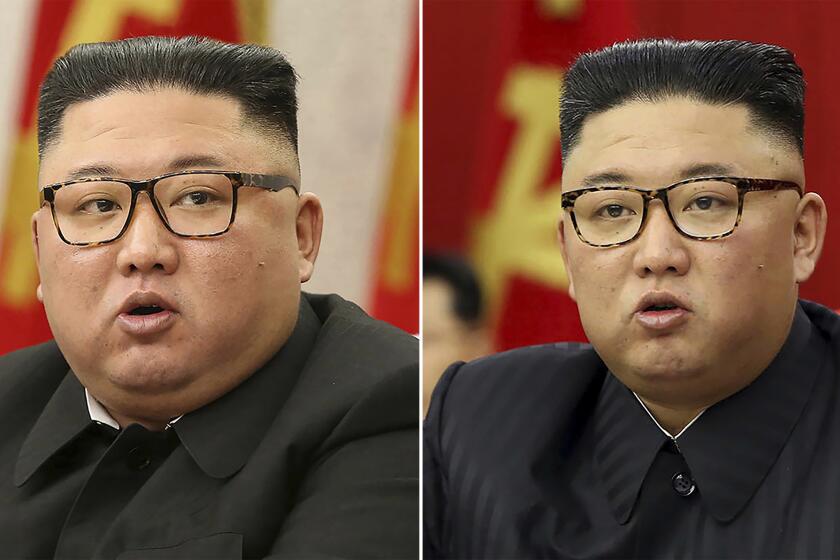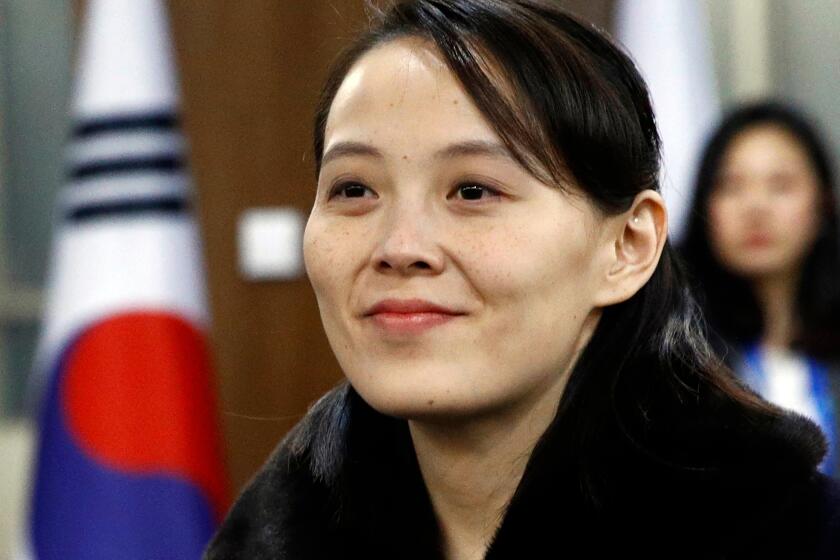North Korea vows to be ‘fully prepared for confrontation’ with U.S.

SEOUL, South Korea — North Korean leader Kim Jong Un ordered his government to be prepared for both dialogue and confrontation with the Biden administration — but more for confrontation, state media reported Friday.
The report came days after the U.S. and others urged Pyongyang to abandon its nuclear program and return to talks. Kim’s statement indicates that he is likely to push to increase his nuclear arsenal and raise pressure on Washington to give up what North Korea considers a hostile policy toward it, but he’ll also prepare for talks to resume, some experts say.
During an ongoing ruling party meeting Thursday, Kim analyzed in detail the policy tendencies of the U.S. under President Biden and clarified steps to be taken in relations with Washington, the Korean Central News Agency said. It did not specify the steps.
Kim “stressed the need to get prepared for both dialogue and confrontation, especially to get fully prepared for confrontation in order to protect the dignity of our state” and ensure national security, it said.
In 2018-19, Kim held a series of summits with then-President Trump to discuss North Korea’s advancing nuclear arsenal. But the negotiations fell apart after Trump rejected Kim’s calls for extensive sanctions relief in return for a partial relinquishment of his nuclear capability.
Biden’s administration has worked to formulate a new approach on North Korea’s nuclear program that it describes as “calibrated and practical.” Details of his North Korea policy haven’t been publicized, but U.S. officials have suggested that Biden will seek a middle ground between Trump’s direct meetings with Kim and former President Obama’s “strategic patience” to curb Kim’s nuclear program.
North Korea’s Kim Jong Un has faced rumors about his health on previous occasions when he walked with a cane and missed a major state anniversary.
Earlier this week, leaders of the Group of 7 wealthy nations issued a statement calling for the complete de-nuclearization of the Korean Peninsula and “the verifiable and irreversible abandonment” of North Korea’s nuclear and missile programs. They called on North Korea to engage and resume dialogue.
Sung Kim, the top U.S. official on North Korea, is to visit Seoul on Saturday for a meeting with South Korean and Japanese officials. The trip emphasizes the importance of three-way cooperation in working toward complete de-nuclearization of the Korean Peninsula, the State Department said.
Kim Jong Un has recently threatened to enlarge his nuclear arsenal and build high-tech weapons targeting the U.S. mainland if Washington refuses to abandon its present policy toward North Korea.
In March, the North Korean military performed its first short-range ballistic missile tests in a year. But Pyongyang is maintaining a moratorium on long-range missile and nuclear tests in an indication that Kim still wants to keep prospects for diplomacy alive.
Kim Yo Jong, the sister of North Korean leader Kim Jong Un, was not listed in the country’s new Politburo lineup, leading to questions about her fate.
Kwak Gil Sup, head of One Korea Center, a website specializing in North Korea affairs, wrote on Facebook that Kim’s statement suggested that he’s taking a two-track approach of bolstering military capability and preparing for talks. But he said Kim would more likely focus on boosting military strength and repeating his demand for the U.S. to withdraw its hostile policy rather than hastily returning to talks.
Kim said last week that North Korea’s military must stay on high alert to defend national security.
Cheong Seong-Chang, an analyst at the Sejong Institute in South Korea, said the North would likely return to talks but would not accept a call for immediate, complete de-nuclearization. He said North Korea might accede to a proposal to freeze its atomic program and partially reduce its nuclear arsenal in phased steps if the Biden administration relaxed sanctions and suspended its regular military drills with South Korea.
Kim convened the ruling Workers’ Party’s Central Committee meeting this week to review efforts to rebuild the economy, which has been severely crippled by pandemic-prompted border closings, mismanagement amid U.S.-led sanctions, and storm damage to crops and infrastructure last year.
On Tuesday, Kim opened the meeting by warning of potential food shortages, urging officials to find ways to boost agricultural production because the country’s food situation “is now getting tense.” He also urged the country to brace for extended coronavirus restrictions, suggesting that North Korea would extend its border closure and other steps despite the stress on its economy.
More to Read
Sign up for Essential California
The most important California stories and recommendations in your inbox every morning.
You may occasionally receive promotional content from the Los Angeles Times.












